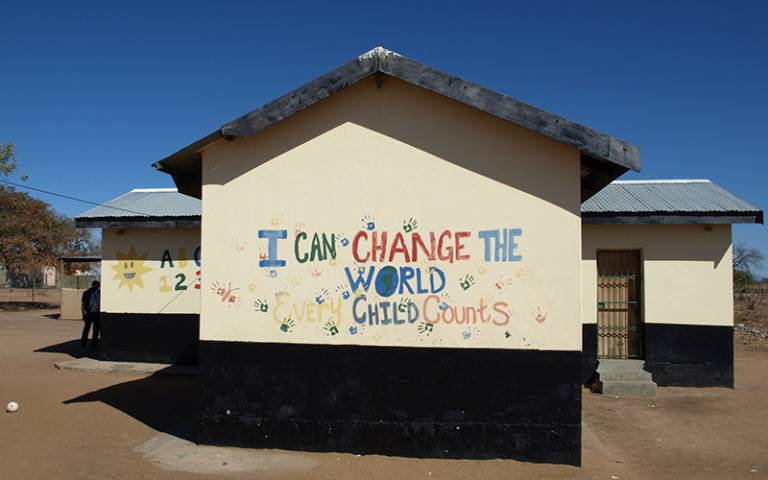Critical perspectives on an indicator framework for the Sustainable Development Goals (SDGs).

Accountability for Gender Equality in Education (AGEE) is a collaborative research project using an innovative framework – the AGEE Framework – for evaluating gender equality in education. The first two phases of the project (2018-2023) were funded by ESRC-FCDO Raising Learning Outcomes programme. A third phase (2024-2027) is being funded by KIX IDRC.
The project works across a number of locations including University College London, the University of Malawi, UNESCO offices, and the University of Kwazulu-Natal.
Objectives
Accountability for Gender Equality in Education (AGEE) is an innovative project which has developed an indicator framework for gender equality in education through critical participatory discussion at local, national, and international levels. The AGEE project is a partnership between universities in Malawi, South Africa and the UK, working with UNESCO and other UN agencies, bilateral donors and a range of civil society organisations. AGEE has been funded by the ESRC, the FCDO and IDRC-KIX.
- Our framework for measuring gender equality in education is designed for use at national and international levels to support local and global commitments to equality, social justice and sustainable development.
- Our framework is both robust and flexible. This means it is responsive to changing local, national and international contexts and issues, and sensitive to pressing contemporary issues including pandemics, emergencies and the climate crisis.
- We have developed our gender equality framework and process for selecting indicators in dialogue with country partners to ensure these capture specific issues on the ground and can support national education departments in policy and practice.
- We are building a global community of practice that brings together a wide range of experts on gender equality and education, from civil society, women’s rights movements and academia to governments and international organisations.
Research team
- Professor Elaine Unterhalter, IOE
- Professor Relebohile Moletsane, University of Kwazulu-Natal
- Dr Esthery Kunkwenzu, University of Malawi
- Dr Helen Longlands, IOE
- Dr Rosie Peppin Vaughan, IOE
- Professor Caine Rolleston, UCL
Academic articles and chapters
2024
- Unterhalter, E., Longlands, H., and Peppin Vaughan, R. (2023) ‘Developing equalities and quality education? Data and indicators for SDG 4’, in Umbach, G. and Tkalec, I. (eds) The Elgar Companion to Data and Indicators for the Sustainable Development Goals (Edward Elgar).
2023
- Longlands, H., Peppin Vaughan, R. and Unterhalter, E. (2023) ‘Gender, Missing Data and SDG4’, in Delprato, M. and Shepard, D. (eds) Missing education data and the SDG 4 data regime: Global, regional and thematic perspectives (Edward Elgar).
2022
- Peppin Vaughan, R., & Longlands, H. (2022). A technology of global governance or the path to gender equality? Reflections on the role of indicators and targets for girls’ education. Comparative Education: an international journal of comparative studies.
- Unterhalter, E., Longlands, H. & Peppin Vaughan, R. (2022) Gender and Intersecting Inequalities in Education: Reflections on a Framework for Measurement, Journal of Human Development and Capabilities.
- Pankhurst, C. (2022). ‘Girls’ Education and Climate Change: A critical review of the literature’. AGEE Working Paper.
2021
- Unterhalter, E. (2021). Addressing intersecting inequalities in education, in T. McCowan and E. Unterhalter (eds.), Education and International Development: An introduction (2nd edition). London: Bloomsbury.
- Unterhalter, E. (2021). ‘A longer view: conceptualising education, identity and the public good in 1917 and 2016’, in S. Carney and E. Klerides (eds.), Identities and Education: Comparative Perspectives in Times of Crisis. London: Bloomsbury (pp.203-221).
2020
- Anand, P. Ferrer, B. Gao, Q. Nogales, R. and Unterhalter, E. (2020). COVID-19 as a Capability Crisis: Using the Capability Framework to Understand Policy Challenges, Journal of Human Development and Capabilities, Vol. 21(3): 293-299.
- Unterhalter, E. (2020). An other self? Education, foreignness, reflexive comparison and capability as connection, Comparative Education, Vol. 56(1).
- Unterhalter, E., Robinson, L. and Ron Balsera, M. (2020). The Politics, Policies and Practices of Intersectionality: Making gender equality inclusive in and through education. Background paper commissioned by UNESCO GEM Report Gender Review 2020. Paris: UNESCO.
2019
- North, A. and Longlands, H. (2019). Gender, poverty and educational equality, in M.J. Schuelke, C. Johnstone, G. Thomas and A. Artiles (eds.), The SAGE handbook of inclusion and diversity in education. London: Sage.
- Peppin Vaughan, R. (2019). Global campaigns for girls’ and women’s education, 2000–2017: insights from transnational social movement theory, Comparative Education, Vol. 55(4): 494-516.
- Unterhalter, E. (2019). The many meanings of quality education: the politics of targets and indicators in SDG4, Global Policy, Vol. 10(S1): 39-51.
- Unterhalter, E. (2019). Balancing pessimism of the intellect and optimism of the will: Some reflections on the capability approach, gender, empowerment, and education in D. Clark, A. Frediani and M. Biggeri (eds.), The Capability Approach, Empowerment and Participation: Concepts, Methods and Applications. London: Palgrave (pp.75-100).
- Unterhalter, E. (2019). Articulation and a theorisation of educational change: Reflections on Harold Wolpe’s work on South Africa in J. Reynolds, B. Fine and R. van Niekerk (eds.), Race, class and the post apartheid democratic state. Durban: University of KwaZulu-Natal Press (pp.213-240).
2018
- Unterhalter, E. (Ed.) (forthcoming 2018). Measuring the unmeasurable in education, Abingdon: Taylor and Francis.
- Unterhalter, E. S., North, A., & Ward, O. (2018). Accountability for gender equality (pdf, 0.8mb), paper commissioned for the 2018 Global Education Monitoring Report Gender Review: Meeting our commitments to gender equality in education, Paris: UNESCO.
2017
- Unterhalter, E. (2017). Negative Capability? Measuring the unmeasurable in education, Comparative Education, Vol. 53 (1): 1-16
2015
- Unterhalter, E. S. (2015). Measuring gender inequality and equality in education. Proceedings of workshop hosted by UNGEI. UNGEI.
 Close
Close

